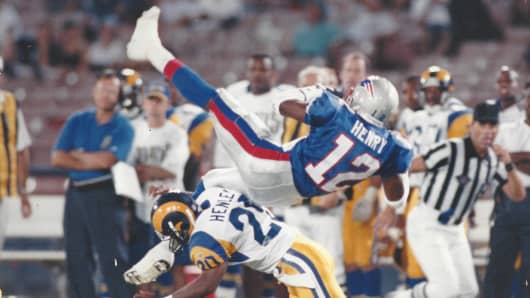About 80 percent of retired National Football League players go broke in their first three years out of the league, according to a report in Sports Illustrated magazine.
The average working person asks, "How is that possible?" That's a fair question, because the average NFL player's salary is close to $2 million per year. The median income is $750,000.
The money drains away quickly for a variety of reasons, and at the top of the list is a lack of financial planning and education. Many top young players, like many kids just out of college, aren't adequately prepared to handle budgets. Player agents such as Leigh Steinberg have pointed out that young NFL players need to have qualified financial advisors who can help protect and grow their money.
But some players don't get great advice; some, instead, are vulnerable to agenda-driven agents who weren't properly screened. There have been numerous stories of athletes who received poor financial advice or saw their millions misappropriated or stolen by agents and hangers-on. Players signing over their power of attorney to agents lose control of their funds, unwisely giving untrustworthy representatives free rein to withdraw funds and make dubious investments.
With the average NFL career lasting less than four years, making critical mistakes with millions of dollars proves costly quickly and far down the road — especially when so many players have yet to plan for a career after football.
I was one of many NFL players who had a short career and went broke. As a former New England Patriot, I was out of football — and money — by the age of 28.
More from Active/Passive:
Ranks of millennial, Gen X millionaires keeps growing
Why traditional investment strategies don't work
I am a lazy, cheap investor. Here's why.
Having experienced the downside of the NFL so young and seen many do the same, it left me wondering how many of these former NFL players would survive financially the rest of their lives. I started looking at the big picture and the decades ahead before retirement. I saw the financial woes of big-money ballplayers as symptomatic of a larger problem plaguing average Americans — a retirement problem, largely due to inadequate knowledge, poor advice and lack of preparation.
Financial experts say many people are poorly prepared or ill-advised in retirement planning and outlive their funds.
Surveys this year by the National Institute on Retirement Security found 88 percent of Americans fear a retirement crisis, and 60 percent are behind schedule in what they need for retirement savings.
Let's face it, many Americans are not planning for the fourth quarter of their lives for those worst-case scenarios, and some who believe they are prepared may have a false sense of security.
Here are some key points you need to consider when planning your financial strategy for retirement:
Home equity and leverage can be a very powerful path for retirement income. That is probably one of the biggest secrets that most financial experts are not aware of. Even if the property's value increases substantially from the original price, it's not easily accessible. What we do not know and understand is that having a paid-off home effectively traps all the money that homeowners have given to the bank, plus appreciation in the house. The only way you can use it is to take out a loan and use the house as collateral, or sell the house outright.
Make sure your financial advisor factors in emergencies. Things such as your life expectancy, the possibility of having a catastrophic disease and at least a 3 percent inflation rate need to be considered. Don't be satisfied when your financial advisor tells you how much money you should have by the end of your working years. Ask what does that translate to hypothetically on a yearly net amount of income? Wall Street has absolutely zero to do with you having enough life-long income. Pensions are disappearing and now the middle class has to gamble on the stock market.
"We have a retirement crisis in this country in which the current financial methods in the near future will possibly fail millions of people."
Search for some alternative retirement planning. On the front end, you're delaying paying taxes on income you invest in a 401(k) plan. But the back end can be a big problem; you have to pay taxes on the money when you withdraw it — and at age 70½ you are required to start making withdrawals whether you want to or not. This could be onerous, depending on your other sources of retirement revenue. Many commonly accepted financial strategies people are using, such as a 401(k), are in reality more myth than fact. If people really understood all the negative implications of delaying taxes, they might think twice about using a 401(k), which wasn't designed to provide lifelong income.
We have a retirement crisis in this country in which the current financial methods in the near future will possibly fail millions of people. There are going to be millions of people who will run out of money in the very near future unless they open themselves to new ideas.
— By Mario Henry, a former NFL player with the New England Patriots. Henry is a financial services professional with 18 years of experience in the industry and author of "How to Hire Your House."












